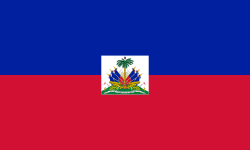HAITI
Population

Population
Population
Originally, the country was populated by Indians. Haiti's current population is largely descended from Africans who were brought to the country as slaves and speaks Kreyòl, a French-based language. In addition, there is a small French-speaking group of half-breeds, or mulattos, the offspring of mostly French fathers and black mothers, who occupy the most important positions in the country and form its elite. Traditionally, there has been much tension and violence between the mulattos and the black majority of the population. Because the majority of the population originally came from Africa, the country still has an African character.
There is high child mortality and illiteracy, AIDS is widespread. Many people leave the countryside and move to the cities. As a result of poverty and the country's troubled situation, emigration from Haiti, especially to the US and the Dominican Republic, has increased significantly in recent decades.
Haiti has a population of 11,754,000 (2024), which is still growing. The growth rate was 1.23% in 2024. Almost 3 million Haitians live in the capital Port-au-Prince. The average life expectancy is 65.6 years. (Men 63.8 years and women 67.4 years) (2017)
Disasters
-2004: Flood. More than 2,000 dead and missing.
-2004: Hurricane Jeanne
-2005: Hurricane Dennis. At least 45 dead.
-2008: Various hurricanes and storms. Nearly 800 dead and hundreds injured.
-2010: Severe earthquake. On 12 January 2010 (16:53 local time), an earthquake measuring 7.0 on the Richter scale struck Haiti. A tsunami alert was issued for Haiti and surrounding islands, but was later withdrawn. The quake was followed by several aftershocks, with a very large aftershock on 20 January measuring 6.1 on the Richter scale. That same day, according to the Haitian government, 75,000 people were buried in mass graves and the same government estimates that the earthquake killed between 100,000 and 200,000 people. 1.5 million people were left homeless.
Even after this, Haiti is affected by natural disasters, partly because the country lies in the path of hurricanes, but mainly because it is a poor country with poor buildings and an inefficient administration.
Language
French, Creole and English are spoken in Haiti.
Haitian Creole, also known as Kreyòl or Patua, is a Creole language spoken in Haiti and other places where Haitians have settled over time, notably the Bahamas, Cuba, the Cayman Islands, the Dominican Republic, French Guiana, Guadeloupe, Puerto Rico and the United States. It is based, on the one hand, on French and, on the other, on various African languages, particularly the Gbe languages. It also contains elements of Arabic, Spanish and Taíno. Today, it is increasingly influenced by English.
Religion
The slaves brought animistic religions with them from Africa. When they arrived in Haiti, they were forcibly converted to Catholicism by priests and plantation owners. A mixture of Catholicism and African religions gave rise to the voodoo cult, the Haitian variant of voodoo, which originated in West Africa. This popular belief is based on a kind of mystical worship, in which spirits are central. The main deity exerts his power through countless spirits, who in turn transfer their power to priests and priestesses. They act as mediums between humans and spirits. During the voodoo cult, those present become possessed of the spirit they revere through drumming, dancing and singing. The spirit then speaks to those present through the medium. Many followers of the voodoo cult are also Catholics.
Influences of the Taíno Indians have also been found in Haitian voodoo. The Catholic Church tried to eradicate voodoo, but without success. The majority of the population is officially Catholic, but many Haitians also practise the voodoo cult. Protestantism has been on the rise in recent decades.
Sources
Elmar Landeninformatie
Wikipedia
CIA - World Factbook
BBC - Country Profiles
Copyright: Team The World of Info